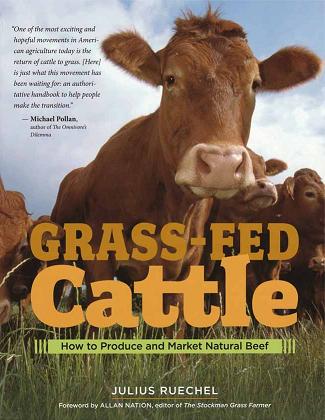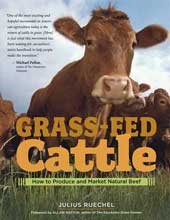Cattle Farming FAQ's
Click on the grass fed cattle farming questions below to expand the answers to the most frequently asked questions - asked by other farmers - about the business of producing grass fed beef.
And if you don't find answers to your questions, use the contact form to get in touch.
ALL ABOUT GRASS FED BEEF PRODUCTION
Is grass-fed beef production more expensive than grain-fed production?It depends… Asking whether grain fed or grass fed cattle farming is cheaper is a bit like asking whether it is cheaper to build a car or a truck... it all depends on the components of the production strategy and how they are combined into a seamless business structure... continue reading about grass fed vs grain fed beef production costs. |
If beef is marketed as 'grass fed,' doesn't that automatically imply that the cattle were raised using a pasture-based cattle farming strategy?From a marketing standpoint, "Grass fed beef" simply means that the beef was produced on a diet primarily consisting of grass and was finished without grain. That's it. However, this marketing label is not restricted to a single 'one-size-fits-all' farming strategy that must be used by all farmers to produce grass fed beef. In reality, there is a huge variety of acceptable farming strategies that can be used to produce grass fed beef - some of which may not look like anything that you imagine when you think of grass fed beef!... continue reading about the wide range of beef farming strategies that can be used to produce grass fed beef. |
I switched to grass-fed production and my costs are much higher than they were before. How can I bring my costs down so I can price my beef competitively but still be grass-fed?It is important to remember that grass fed beef is just the end product and that there are many different viable cattle farming strategies to create it. If your current grass fed beef production strategy is not cost-efficient, then your business plan and your cattle farming strategy still need some work. Many producers simply focus on the end goal - producing grass-fed beef. They essentially continue to produce beef in exactly the same way (+/- a few subtle changes), but tack on a grass-finishing program at the end, and then are surprised that their costs are really high... This article about the top 9 reasons why production costs are too high on many grass fed beef operations explains some of the key things producers can do to bring their grass fed production costs down. |
My neighbor's farm is grass fed, but they do things very different than the strategies described on your website or in your book. Are they doing something wrong?The point of my book and my website is to gather together different grass-fed production strategies and show how to tie them together as a single comprehensive and cohesive production strategy, from calf birth right to the end-market.  However, the strategies I have show-cased are not "the" single only cattle farming method that can be used to produce grass-fed beef. Every farmer must design and build their own cattle strategy. Although there will be many similarities, especially during the final grass-finishing stage, there will also be vast differences that reflect the farm's climate, experience level, personal beliefs, financial considerations, and so on. Furthermore, some farms will specialize by focusing their business around a single part of the beef production process, such as only cow/calf, or only stockers, or only grass-finishing, each of which will each have its own character. And it is also important to remember that each grass-fed business needs to be structured to mesh well with any other enterprises that are ongoing on that particular farm. As long as a farm is financially sustainable and their beef qualifies as grass-fed, then their grass-fed business is not 'wrong' even if it looks different than what you expected. There is always more than one way to reach the same goal. There may be valid ways to improve on any particular farm's strategy, or another farmer might organize the same farm in a different way, but it is unfair to judge any farm production strategy as 'wrong' simply because it is different. This discussion holds an important lesson for when you set up your own farm. Learn from other farmers, understand what and especially WHY they do things the way they do. But don't copy blindly. Take that information and build your own production strategy to fit YOU. This advice applies equally regardless of where you get your information, whether it is from a neighbour's farm, a well-respected 'model' grass-fed business, a book, a conference, a workshop, or something you read here on this website or in my book. Learn the principles and understand the fundamental reasons behind each strategy you consider. But then take the time to design your own production strategy - build it from the ground up. Imagine yourself building a factory where the design team, assembly line, quality control, financing, marketing department, and accounting team ALL need to work in sync. When looking over the fence at any farm, all you see is their 'assembly line' (the production system out on pasture). It is easy to forget that this production strategy is simply a single component is a much larger overall plan, the rest of which is NOT visible simply by looking at how the cows are managed out on pasture. Acknowledge the differences, understand the reasons why they do things differently than you expected, and be open to those differences. Sometimes what looks 'wrong' at first glance may actually contain valuable lessons for how to set up your own cattle farming strategy! |
GETTING STARTED in GRASS FED CATTLE FARMING
I want to start a grass fed cattle business, from scratch. Where do I start?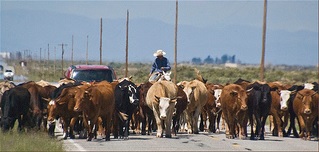 Image Credit: Ron Cogswell, Flickr, CC BY 2.0 While every person's journey to set up their own cattle farming business will be different based on their individual circumstances and experience levels, here is some general advice: Make the commitment to yourself that you will put together your complete comprehensive business plan, including production and marketing strategy as well as ALL the financial calculations, BEFORE you start making any changes. Take as much time as you need. Planning is cheap. Time, cattle, land, and equipment is not. Plan first, then build. Half a plan is worse than no plan at all. Depending on your level of expertise in the industry, you may want to take the time to apprentice with someone who is already doing something similar to what you plan to do. Nothing can replace practical hands-on experience. In the long run, taking an extra year or two to work for someone else (even volunteer) will get you to your goals faster than diving in without any experience. Read. And go to trade conferences and workshops. But continue working on your cattle farming plan as you educate yourself. Turning to experts can also create the habit of chasing after a holy grail, creating the illusion that someone else will have the magic answer for how to do things, that their input is more relevant than your own because you assume that they know more than you do. Experts are a source of education, but the ultimate responsibility for how to set up your business, and the only person that can truly coordinate everything that is required to set up your successful business, is YOU. There is a time and a place for education - use it to build your foundation of knowledge. But once you have a basic foundation of knowledge, stop reading and stop going to conferences, and instead shift gears to focus all your energy and time on building your farm business plan. It is time to get your hands dirty and your nose bloodied by experience, and start putting theory into practice. No expert's advice can replace what you gain by getting in the driver's seat. The holy grail is that there is no holy grail - just the slow methodical process of taking 100% responsibility for building your own business plan. Once you begin building your plan, you will know when the time is right to seek out a specific book, go to a specific workshop, or talk to a specific expert in order to fill a very specific gap in your knowledge base and take your plan to the next level. Don't strive for absolute perfection. Strive for consistent progress instead. Give yourself permission to make mistakes and learn as you go. By giving yourself permission to only be 95% perfect, small setbacks become opportunities for improvement and more learning, rather than a sign of failure. This simple perspective shift allows you to get in the driver's seat and start, while acknowledging that even with a solid foundation of knowledge, the initial plan, however thorough, will not be perfect. Perfection is achieved through constant improvements along the way, not by setting yourself the impossible task of being perfect right out of the gate. This perspective keeps you open to seeing where you can improve things along the way and notice early where you have a gap in your skill set that you need to fill. There is no such thing as the perfect farm any more than there is the perfect iPhone or the perfect car. Next year's model will always be an improvement on this year's. We learn from our experience. Commit to doing, to learning from what you are doing, and doing it even better next season based on what you learned this season. Success is a process, not a destination. If you are ready to start building your knowledge of grass-fed cattle farming, you can start with my book - Grass Fed Cattle - , which is specifically designed to build a solid knowledge base about grass fed cattle production before moving on to guide you through the planning and then the construction and operation-phases of your grass-fed cattle farming business. It is designed to structure your journey, to give you a planning framework from within which to design your own path. I also recommend starting with the grazing strategy articles on this website, reading them in order, followed by the electric fencing, livestock water, and grass-finishing articles. This article series is designed as a sort of "grazing school", again moving from broad knowledge towards construction and hands-on operation of your business. All the best for your grass-fed journey. ... P.S. And both I and the other readers of this website would love to hear from you from time to time as you progress along your journey. Please share your cattle farming experiences via my contact form. |
Is there a single right way to set up a grass-fed farm?Yes and No. Let me explain… If you sell grass-fed beef then you cannot use grain in your cattle farming strategy - that would be deceptive and misleading to your customers. So, not including grain in your grass fed production strategy is a 'right' way to set up your grass fed farm. Plan every detail before you begin setting up your farm or making changes to an existing farm. You should plan every single step in advance, including detailed calculations about the financial viability of your strategy, so that the setup and operation is like following a recipe - the recipe you created… your business plan. So, planning before you start and doing the calculations to ensure that your business plan will be profitable before you begin is a 'right' way to set up your grass fed farm. Having said all that, there is no single right way to set up a grass-fed cattle farming program. Many paths lead to the same goal. There are many different grazing strategies, many different calving dates, many different breed choices, many different grass-finishing crops, and so on, all of which are valid options for your production strategy. In the end, there is no single right formula for everyone, but there is a right formula custom-designed to fit YOU and only you. That is why it is important to plan first, then build it, so you can truly custom-design a production strategy and business plan that fits your needs, your climate, your business considerations, your beliefs, your personality, your financial expectations and your goals. I need advice about my specific farm - can you help me?I do not provide individual advice to individual farms or to individual farmers. However, my book and website are intended to help guide you through the step-by-step planning process to design your own cattle farming strategy. And I encourage you to use the contact form to ask about topics that you would like to learn more about so I can address them in future articles. For detailed product advice about your specific situation, I recommend contacting the farm support professionals in your areas, such as the veterinarians, soil consultants, or electric fence suppliers as they can explain their products so you can evaluate how they will fit into your cattle farming strategy. I also recommend contacting other local grass-fed farmers in your area who have similar production strategies to your own as you will likely face similar challenges, which can be solved through similar solutions. I also get many questions about whether certain products or strategies are okay for selling certified organic beef. In this case, contact your organic association as they should have the answers for you - it's their job, that is why you have to pay them! If they don't like a product you are using, press them to give you a proven alternative - after all, they should be a facilitator, not an impediment to your production strategy. If they don't have answers for you, perhaps you are using the wrong organic association and you should consider a switch - and in fairness, if the majority of the farms in their association are market gardens, vegetable producers or grain farmers, rather than grass-fed beef farmers, then is quite reasonable if they are not familiar with all the answers to your questions. Make sure you pick an association that has lots of other farms producing a similar product using a similar production strategy, because then the questions you have will be familiar territory to them. I want to switch my existing cattle business to grass fed production. How do I make the transition?Changing the structure of your cattle farming business is not something to be undertaken lightly. Many people are eager for a change because their current cattle farming business is not working properly anymore - the temptation is to dive into a new strategy with the new business plan only half-baked because of the eagerness (or desperation) to change what you are doing. Half a plan is even more dangerous than not making any changes at all... continue reading how to plan a smooth transition from your current cattle ranching strategy to grass fed beef production. |
What are the three most important changes I can make to transition my current cattle farm to grass-fed production?Without knowing the specific details of how your current farm is structured, I would say, in this order: Set up your grazing as a DAILY pasture rotation. The daily pasture rotation is the key to all your grazing strategies. Not only does it dramatically improve cattle nutrition and increase grass-productivity, it also is key to being able to use your cattle herd as a pasture management tool. And if you want to learn how to extend your grazing season deep into the winter (see below), you will need a daily pasture rotation in order to create your high-quality winter pastures and also to be able to effectively graze them during the winter grazing season. The daily pasture rotation is also the key grazing strategy that allows you to calve during the pasture rotation (see below). Without carefully planned daily pasture moves, calving on pasture can quickly turn to chaos. If you have a cow/calf herd, shift your calving season so that your cows calve on pasture during the growing season timed to coincide with the calving date used by the wild grazing species in your area (deer, moose, antelope, etc). You want to give your cows ample time to fatten up on spring pasture (at least 3-4 weeks) BEFORE calving begins. Shifting your calving season in this way positively impacts everything from calf survival rates to cow fertility to winter feed costs and determines which grazing strategies that you can or cannot use with your cattle herd. And learn how to extend your grazing season as long as possible after the growing season ends by learning how to create high-quality winter pastures and becoming an expert at winter grazing strategies. Winter-grazing is the KEY cattle farming strategy for reducing your feed costs. If you only graze stockers or buy young cattle for grass-finishing, winter grazing is an essential strategy to help you reduce your production costs. However, if you have a cow-calf herd, yoiu can only utilize the power of winter grazing if you also shift your calving season to occur during the growing season, as discussed in the previous point. Always remember to work with a livestock nutritionist and to take monthly forage analyses to support your winter grazing strategy. |
TOOLS and PASTURE TECHNOLOGIES
I am having trouble sourcing some of the products mentioned in your book. Where can I find them?Pasture technologies and cattle farming products are constantly improving - so it is an ever-changing landscape. Follow the link to the grazing tips and pasture technologies page to see innovative product tips from other readers and to share innovative products you have found. The more we all share, the more we support one another and the faster the technology and skills of grass-fed production can spread. |
My vet, soil lab, animal nutritionist, or agricultural extension agent recommends a certain product _____ (i.e. parasite control, immunization, antibiotic, fertilizer, pesticide etc.). Is this product safe…?This is a question that you need to ask your vet or supplier. If you have any concerns, get a second opinion from a different supplier or different vet. Each product should come with clear instructions about withdrawal periods and other usage instructions. Follow these carefully. The end... Unfortunately, it's not that simple. The volume of emails I receive about product safety reveals the deep skepticism that many people - both farmers and consumers - have about the use and safety of certain agricultural products... continue reading how to assess the safety of various agricultural products for your cattle farming strategy. |
Is this product _____ (i.e. parasite control, immunization, antibiotic, fertilizer, pesticide, etc) okay to use for organic cattle farming?To find out about whether an specific agricultural product is acceptable to use for organic beef production, contact your organic association to find out what their regulatory position is on the product that you are interested in. The status of products are changing all the time and vary among different organic associations. |
ORGANIC CERTIFICATION
Do I need organic certification for my grass-fed beef?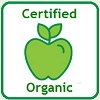 Whether you need organic certification or not depends entirely on how you plan to market your beef. You will have to judge for yourself whether the extra market opportunities (and potentially the extra price premium you can get for selling 'certified organic grass fed beef' versus simply selling 'grass fed beef') justify the extra time, effort, and paperwork that you will need to go through to circumnavigate the certification process. Organic certification will also restrict many of the tools that you are allowed to use on your farm - including (but not limited to) the kinds of fertilizers you are allowed to use on your pastures, the treatment protocols you are allowed to use with your animals, the butchers you are allowed to use to slaughter your animals, the kinds of fence posts you are allowed to use on your farm, as well as what kind of weed and parasite management strategies you are allowed to use. You may also be required to create buffer zones to neighboring non-organic farms, which have to be excluded from grazing or crop production (but still need some kind of weed management strategy). Organic certification is not something you want to step into lightly. It is a BIG commitment - and you better know exactly how you will manage your farm in an organic management system before making the switch -- i.e. what fertilizers, parasite measures, butchers, etc you will use -- to ensure that your production strategy can continue to forge ahead. And it also requires a considerable extra amount of recordkeeping and paperwork. Having said all that, 'organic beef' is becoming easier to source and 'grass-fed beef' is also becoming more common, but the combination of 'organic grass fed beef' is still relatively rare, so it will give you a marketing advantage, which may or may not allow you to command a price premium over the other two products. However, whether the potential (not guaranteed) marketing advantage and the potential (not guaranteed) additional price premium warrants the extra effort, extra time, and extra costs associated with organic certification is something that you will have to calculate and evaluate for your individual situation. |
I am considering getting organic certification for the extra marketing possibilities, but my organic association's rules don't make any sense for grass-fed cattle producers (i.e. bedding during winter grazing, tagging calves at birth, treated fence posts for my miles and miles of fencelines). Help?On one level, the organic association should be well enough informed about your style of farming to be able to provide alternative to products that you are restricted from using (i.e. the treated fence post issue). 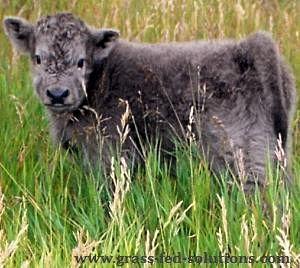 And considering that grass-fed cattle farming is much more environmentally-sustainable and in my opinion provides cattle with a much higher quality of life than being restricted inside cattle feed pens, your chosen organic association should be sufficiently informed about grass-fed production to understand when your cattle need bedding and when they don't. They should also understand that a pasture calving program should not require tagging at birth, but rather can be accomplished at a later more realistic time, such as the strategy described in The Cattle Year on Grass chapter of Grass-Fed Cattle and in this article. You may also need to do some educating - be patient, provide the organic association with literature to show them more about the production model you are using, and be proactive about suggesting alternative products if they restrict a product you are using. It's a young industry that is still evolving, so the unequal dispersal of information within the industry is part of the growing pains of being part of something different than what is currently mainstream. However, having said that, not all organic associations are created equal, and these differences are not necessarily because of a lack of effort or a lack of good will on their part. If an organic association mostly deals with small market gardens, orchards, or grain crops, then the know-how about what makes sense for your cattle farming system may simply not be part of their every-day certification experience. You are not the first grass-fed cattle farm to seek organic certification, so someone somewhere has already solved these same problems with their organic association. Contact other organic grass-fed farms and discuss how they sorted out these concerns with their organic associations. And in some cases, you may want to switch to a different organic association, specifically one that has lots of other similar cattle farming operations to your own (not just 1 or 2) so that the products and strategies that you use are not unique to just your operation. Picking an organic association with other grass-fed beef farmers in it also means you will benefit by being able to connect with other farmers doing similar things, which means you are building a support group for yourself, both for information exchange and for moral support as you face challenges in your business. |
BOOKS and FURTHER EDUCATION
Where can I buy your book - Grass-Fed Cattle: how to produce and market natural beef?It is available through most major book chains. You can learn more about my book here, or follow one of the links below to your favorite bookseller. I get commissions for purchases made using the Amazon links in my post. Available in the US:
In Canada:
In the UK:
|
My books:
(I get commissions for purchases made using Amazon links in my post.)
Affiliate products.
In my articles I recommend some of my favorite cattle farming books and products. If you buy something through one of those links, I receive a small commission. There is no additional cost to you. To learn more, please see my affiliate disclosure document.
Subscribe to my free email notifications for new articles:
As an Amazon Associate I earn from qualifying purchases. Click to learn more about my Affiliates Policies.
As an Amazon Associate I earn from qualifying purchases. Click to learn more about my Affiliates Policies.

